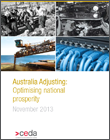CEDA's major report for 2013 was released in November 2013. The report, titled Australia Adjusting: Optimising national prosperity, puts forward a comprehensive economic reform agenda to secure Australia's future prosperity.
 Australia's long-running economic expansion has not come about by luck or good fortune. It has been the result of significant reforms introduced to position Australia for the future. Those reforms underpinned a two decade economic expansion. While the right policy settings have the potential to extend this for another decade, this outcome will not be achieved without major reforms aimed at improving the nation's international competitiveness.
Australia's long-running economic expansion has not come about by luck or good fortune. It has been the result of significant reforms introduced to position Australia for the future. Those reforms underpinned a two decade economic expansion. While the right policy settings have the potential to extend this for another decade, this outcome will not be achieved without major reforms aimed at improving the nation's international competitiveness.
Released in November 2013, Australia Adjusting:Optimising national prosperity puts forward a comprehensive economic reform agenda for an open and adaptive nation to enhance its economic flexibility, improve its capacity to innovate and maximise the potential of its human capital. The recommendations form the basis of a National Productivity Policy (NPP) to drive a sustained improvement to Australia's productivity so that the nation can realise ongoing economic growth.
For this report CEDA has drawn on its past research and sought the views of a number of Australia's foremost economists and public policy analysts. These included CEDA's Council on Economic Policy (CCEP) contributions from Dr John Edwards on Australia 2022, Professor Gary Banks AO on the microeconomic reform agenda, and Professor Greg Smith and Professor John Freebairn on tax reform. Research findings associated with CEDA's reports on Australia's population, its water resources and its energy options highlighted how the outcomes experienced by the nation in each area are a consequence of policy decisions and not economic inevitability.
Read media release - Industry subsidies should be phased out, loans made available
Chapters and authors
Section 1 The economic imperative: a national productivity policy
Chapter 1.1
Regaining competitiveness: The economic imperative
CEDA, Chief Economist, Nathan Taylor
Chapter 1.2
An agenda to revive Australia's competitiveness
CEDA, Senior Research Fellow, Dr Vince FitzGerald
Section 2 Economic flexibility
Chapter 2.1
Addressing rigidities in the economy: Re-energising National Competition Policy reform
Former Chairman of the ACCC and Monash University, Faculty of Business and Economics, Vice-Chancellor's Professorial Fellow, Professor Graeme Samuel AC
Chapter 2.2
An efficient and competitive taxation system
Australian Catholic University, Adjunct Professor; Commonwealth Grants Commission, Chairman; and Melbourne Law School, Senior Fellow, Professor Greg Smith
Chapter 2.3
Adaptive and efficient federalism
University of Queensland Business School, J D Story Professor of Public Administration, Professor Kenneth Wiltshire AO
Chapter 2.4
Productivity enhancing regulatory reform
RMIT University, Professor of Institutional Economics, Professor Sinclair Davidson
Chapter 2.5
Sustainable and efficient delivery of urban infrastructure
KDR Gold Coast, Managing Director, Vivienne King
Chapter 2.6
Delivering efficient public infrastructure: Some new trends
Curtin University, Professor of Sustainability and Curtin University Sustainability Policy Institute, Director, Professor Peter Newman and James McIntosh Consulting, Integrated Land Use and Transport Consultant, James McIntosh
Chapter 2.7
Smart infrastructure
IBM Australia/New Zealand, Smarter Cities & Planet Executive, Catherine Caruana-McManus
Section 3 Incentivising innovation
Chapter 3.1
Innovation Australia: How we measure up
University of Technology Sydney, UTS Business School, Dean, Professor Roy Green and University of Technology Sydney, Senior Lecturer in innovation, strategy and organisation, Dr Danielle Logue
Chapter 3.2
The innovation ecosystem
Member of PM's Manufacturing Leaders Group; and Chair of the Advanced Manufacturing Council, Professor Göran Roos
Chapter 3.3
Policy innovation for innovation: Income-contingent loans
Australian National University, Crawford School of Public Policy, Professor of Economics, Professor Glenn Withers AO and Australian Council of Learned Academies, Research Fellow, Dr Nitin Gupta
Chapter 3.4
A proposal for industry-led innovation consortia
Intellectual Property Institute of Australia, Director, Professor Beth Webster
Chapter 3.5
Sectoral revolution through technological developments
CSIRO, Digital Productivity and Services Flagship, Director, Dr Ian Oppermann
Section 4 Capability and workforce development
Chapter 4.1
Key trends in Australia's workforce
Australian Workforce and Productivity Agency, Chair, Philip Bullock
Chapter 4.2
Human capital and economic growth
ACIL Allen Consulting, Director of the Education and Innovation practice, Peter Noonan and ACIL Allen Consulting, Principal, Andrew Wade
Chapter 4.3
The future of work
IBISWorld, Founder and Chairman, Phil Ruthven
Chapter 4.4
Australia's industrial relations system and the need for organisational agility
Macquarie University, Faculty of Business and Economics, Professor of Management and Associate Dean (Research), Professor Paul Gollan and Macquarie University, Faculty of Business and Economics, Department of Marketing and Management, Research Fellow, Dr Senia Kalfa
Australia Adjusting events
Brisbane - Wednesday, 6 November 2013 - Launch event
Perth - Friday, 15 November 2013
Melbourne - Tuesday, 19 November 2013
Sydney - Thursday, 21 November 2013
Adelaide,Friday, 29 November 2013